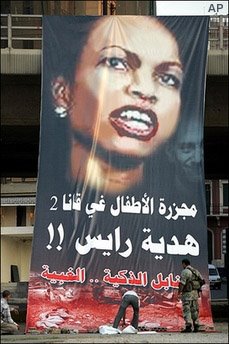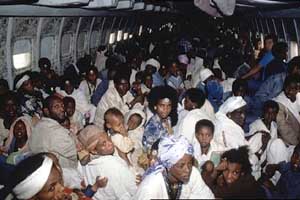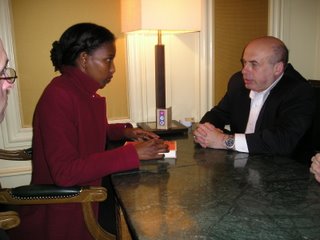Demonization of women by political Islam
 This picture of Afro-American Rice I found at a Sunni Sisterhood site with the explaining text: A message to Rice from some of the people: “”The massacre of children in Qana 2, is the gift of Rice. The clever bombs.. Stupid.”
This picture of Afro-American Rice I found at a Sunni Sisterhood site with the explaining text: A message to Rice from some of the people: “”The massacre of children in Qana 2, is the gift of Rice. The clever bombs.. Stupid.”This truck size piece of cloth with the chopped head of Rice has also been on the BBC and Dutch TV and is a fine example of Islamitic billbord art.
Lipstick or red gloss has been added for blood suggesting a vampire after the bite. The street is made red for running riviers of blood with some evil smiling jewish djin lurking in the darkness behind it all.
The blood dripping lips, even under the nose, would do well for a horror movie and the red letters work well for the deepth.
This islam image-language with talking head in the backgrond whispering into the bigger head has been implemented succesfully into Africa as Mogadishu born Hirsi Ali explains from her youth in muslim conquered lands;
"the picture was always a huge head with a large nose, and inside the head of this Sheitan, this Jewish Satan was balding, and there would be a valley in the middle, and there are little Sheitans or little evil genies, little evil spirits would come out. And they were very naughty and they would seduce us into committing sins, and luring us from fulfilling the obligations of Allah."
The nose is bigger since the photo is taken from below, the head is almost picture filling big,
the jewish person is not in color and if one looks fast you do not see it first and there are little persons. The political Islam is perhaps trying to communicate that the big Satan America and his She-Devil are to blame for the IDF response to the Hezbollah or Gaza rockets.
So this is what one has to learn from this war; black women are evil, bloodthirsty creatures of Satan and they go to schools with mixed Israeli and American flag as doormat on the floors in the corridor at the classroom entrance. Perhaps the USA fly's clever bombs to Israel, Hezbollah gets them from the Russians, Iran and China. In Darfur more people are killed per day by Arab militia's then in the whole Lebanon war.
The demonizating of women by Islam will never be solved like this demonization of women in billboard ads as well as in the entertainment industries in general. Overwhelmingly, women are portrayed in the most negative manner: wearing indecent attire and too much make-up, looking sexually provocative, exhibiting masculine and/or inappropriate characteristics, and engaging in occupations and social roles which are considered immoral and degrading. Billboard ads depicting violence...
Ayaan Hirsi Ali on Israel in the Jerusalem Post By MANFRED GERSTENFELD;
"I visited Israel a few years ago, primarily to understand how it dealt so well with so many immigrants from different origins," she says. "My main impression was that Israel is a liberal democracy. In the places I visited, including Jerusalem as well as Tel Aviv and its beaches, I saw that men and women are equal. One never knows what happens behind the scenes, but that is how it appears to the visitor. The many women in the army are also very visible.
"I understood that a crucial element of success is the unifying factor among immigrants to Israel. Whether one arrives from Ethiopia or Russia, or one's grandparents immigrated from Europe, what binds them is being Jewish. Such a bond is lacking in the Netherlands. Our immigrants' background is diverse and also differs greatly from that of the Netherlands, including religion."
An African Woman in America has comments;
I disagree with how well the Ethiopian Jews integrated with the rest of the population in Israel. Most of the Ethiopian Jews are having a hard time integrating, their version of Judaism predates the current form of Judaism in Israel, they look different from most of the population, the first generation is not educated because most of them were farmers from the country side creating a big gap between their kids and all other Jewish Immigrants. They also live mostly in ghettos close to the absorption centers that they come in first making the problems worse.
I think taking the Ethiopian Jews from Ethiopia to Israel was a big mistake. In Ethiopia, they were considered as one of the brethren.
So far An African Woman in America at Booker Rising. My comment; Although the "predates" is questionable some talked them into America. In 1997, the Netanyahu administration decided to stop immigration of Fellachen after a final group of 4,000 immigrants. Between 18,000 and 26,000 Falasha Mura remain in Ethiopia today. So perhaps the African Woman is right. And if "they were considered as one of the brethren" why are they called stranger/alien or Falasha? And if safari is Swahili for travel can "falasha safari" mean weird route?
However 1990 in May, rebels took control of Addis Ababa and Mariam fled. In late 1990, worried about what might happen to Ethiopian Jews during a political transition period, aliyah and aid workers, the Jewish Agency, Israeli government and Israel Defense Forces had already made covert preparations to airlift and absorb Ethiopian Jews. On Friday May 24, as the rebels closed in, Operation Solomon began. Over the course of 36 hours, a total of 34 El Al C-130 Hercules - with their seats removed to maximize passenger capacity - flew non-stop. 14,325 Ethiopian Jews came to Israel.
 So Ethiopian Jews should have been let to be killed and taking them to Israel was a big mistake?
So Ethiopian Jews should have been let to be killed and taking them to Israel was a big mistake?Von Ende 1984 bis Anfang 1985 wurden in der Operation Moses über 12 000 Fellachen über eine Luftbrücke nach Israel umgesiedelt. Tausende wurden von Mitgliedern des Mossad (Israels berüchtigter Geheimdienst) durch Wüsten und über Bergrücken in den Sudan geführt und von dort in gecharterten Flugzeugen „auf Adlerschwingen* nach Zion“ gebracht. *Eaglewings
Besides who would have the nerve to tell Ayaan that tens of thousands of Falasha's gave their blood to the bloodbanks when the intifada started and thousands of liters were never used by the hospitals and army so washed away throught the gutters of Israel.
 Did this likud minister Natan Sharansky, former Soviet political prisoner?
Did this likud minister Natan Sharansky, former Soviet political prisoner?
Back to the jpost interview;
Not all of Hirsi Ali's reactions to what she saw in Israel were positive, however.
Her "From my superficial impression, the country also has a problem with fundamentalists,"
& "The ultra-Orthodox will cause a demographic problem because these fanatics have more children than the secular and the regular Orthodox." is lifted out of context by PipeLineNews "Statement By American Enterprise Institute Scholar To Be - Ayaan Hirsi Ali - Raises Conservative Hackles " since the interview appears to be done before this intifada started.

The editor also raises the question "Why would she employ the term "fanatics" to describe Israel's most devout Jews?".
To call someone a fanatic sportsman would be considered a compliment but fanatic devotism is too puzzeling or not allowed to discribe some Jews. Fanatic means highly motivated and is a neutral term f.i. the turkish fanatik sports news gazet.
Fan is short for fanatic and some are so devouted to their favorite sport the side effect is more childern.
On Palestinians
"I have visited the Palestinian quarters in Jerusalem as well. Their side is dilapidated, for which they blame the Israelis. In private, however, I met a young Palestinian who spoke excellent English. There were no cameras and no notebooks. He said the situation was partly their own fault, with much of the money sent from abroad to build Palestine being stolen by corrupt leaders.
"When I start to speak in the Netherlands about the corruption of the Palestinian Authority and the role of Arafat in the tragedy of Palestine, I do not get a large audience. Often one is talking to a wall. Many people reply that Israel first has to withdraw from the territories, and then all will be well with Palestine."
On Double Moral Standards
"The crisis of Dutch socialism can be sized up in its attitudes toward both Islam and Israel. It holds Israel to exceptionally high moral standards. The Israelis, however, will always do well, because they themselves set high standards for their actions.
"The standards for judging the Palestinians, however, are very low. Most outsiders remain silent on all the problems in their territories. That helps the Palestinians become even more corrupt than they already are. Those who live in the territories are not allowed to say anything about this because they risk being murdered by their own people."
On Islam
Hirsi Ali's criticism of Islam is more general. "Almost nobody in the West wants to understand that Islam's problems are structural. Contemporary Islam hardly exists. Islam stopped thinking in the year 900 and has stood still for more than a thousand years. Western Muslims, however, live in an environment where you can think independently without your head being chopped off by somebody.
"If one wants to meet contemporary Muslims, one has to go to the Ahmadiyya movement. The Muslim mainstream, however, considers them heretics. I have been educated as a Muslim and I want to change some of Islam's tenets. This makes me a heretic and thus radicals want to eliminate me."
Hirsi Ali explains why she is a danger to radical Muslims.
"They realize that I know too much about Islam. I am also a woman. If a woman no longer believes, she frees herself. They are deathly afraid that if one drops out, others may follow; that is how herds function."
The writer is Chairman of the Board of Fellows at the Jerusalem Center for Public Affairs. This interview was part of a major project of about 100 interviews with prominent Dutch people on the Dutch attitude toward Jews and Israel, which was funded by the Israel Maror Foundation.
Labels: holocaust, propaganda
